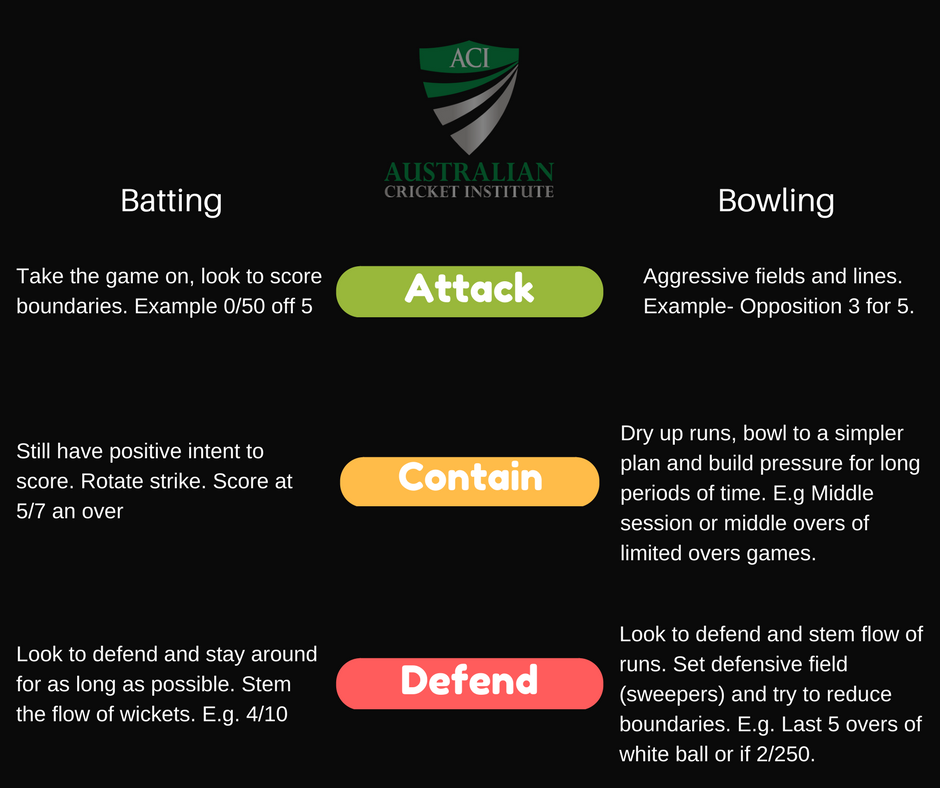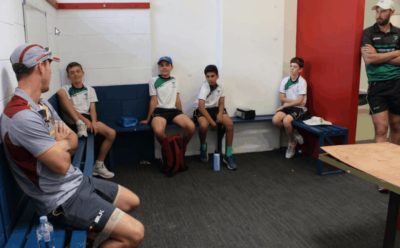Knowing all the skills of the game is important, though it's understanding when and how to use them that is crucial to peak or maximum performance.
A lot of time in junior development is spent on implementing and refining the technical and skill aspects of the game, which are obviously core components in playing cricket. But, if you were to do up a chart, pie graph, map or otherwise it becomes apparent that there are significant other elements that are important in becoming the best player they can. These complimentary elements or skills are often hugely neglected in favour of skill and technical development.
Think of it this way…
Most domestic clubs train twice a week for up to 1.5 hours, with the majority of that time spent on batting and bowling in the nets with a little bit of fielding. Of that time spent in the nets, how often do we mimic real-life, game situations?
As a coach most of the time (junior and beginner age groups excepted) you have no control over what the player does on the field.
Can you stand next to little Johnny when the team is batting and needs 8 an over and tell him where to hit each ball?
Stand next to Sally when she is about to bowl her over and tell her where to bowl each ball in a tight finish to a game? No.
We need to make sure that kids are getting these learning outcomes from the get go.
Our role is to make sure that the environment we create allows the children learn from their successes and mistakes while giving vital input and asking questions so they are able to take in this information and digest it, but also self experiment and discover what works for them.
Here at the ACI we have come up with a checklist of the 5 most important area’s/changes that you can make to your game to ensure that you or your athletes can take the next step to unlocking a greater knowledge of their game, and how to be successful in any situation the game throws at them.
- Understand the Stage of the game you are in
At any Stage in cricket there's three stages each team can be in. Attack, Contain or Defend.Alternatively, call it Red light, Yellow Light, Green Light or Stage 1, 2, or 3..

(stages of play guide)
It is important to make sure you and your team mates/ children can identify where they're at in their game. Are you 3/12 batting and looking to score at 8 an over...? (probably not) or are you bowling and the team is 0/40 off 3?
Having an understanding of what stage the game is in will help you dictate the tempo of the game and will get you out of tough positions, or alternatively know when the best time is to take the game on and finish it off.
- Developing Clear Plans
Understanding your strengths and weaknesses as a player will help you develop game plans for all types of bowlers/batters and/or scenarios.
This ensures that when you are in a high pressure situation during a game, you already understand what you are trying to do/achieve and this makes you much more confident in your abilities and your ability to execute a clear plan.
In all ACI programs, we spend a lot of time on this aspect of the Tactical Awareness concept.
- Learning from your mistakes
An extremely important aspect. Every time you don’t succeed, make a mistake or don’t win a game/situation it is a great learning opportunity.
Consider what you did well, what you may have struggled with and identify areas in the game/performance that made the outcome what it was and find ways to rectify this so that the same mistakes and result do not happen again.
A great way to do this is self-reflection. Next time the situation or game doesn’t go so well ask yourself this..
“What did I do well?
What area did I struggle with and why?
What could I do differently next time?
How can I train to rectify this?”
Having this continual self-reflection gives you the ability to dissect things that you did and didn’t do well. Identify areas or situations/decisions that give you success, but also identify areas of weakness.
Continual self-reflection gives you the ability to then plan your training focuses going forward. Rectifying any problem area’s in your game, but also identifying areas of strength and working both to continue your progression and ensure your consistency and performance continues to excel.
- Training with a purpose to make games easier

Ever heard the expression “Train Hard – Play Easy”?
The best way to continually improve your game awareness and develop your own strengths is to put yourself into situations through your training over a range of match style simulations and scenarios.
Too many players coast through a net or training session… Have no real purpose or goal they want to get out of their session. For example, batting in the easy net all the time, or bowling with a new ball every session for the whole season.
Ways to improve your skillset is to vary it throughout your training and create different challenges or competitions to simulate certain game scenarios.
Struggling to bowl at the death? Set your field, bowl with an old ball and do a 3-minute cardio exercise going in with some fatigue to see how you react and execute under some pressure and tired legs…
Or perhaps you may struggle to accumulate and score in the middle overs of the game? Set yourself a target for 3 overs to go at 7 an over. Have the bowlers set their fields, and play out this challenge. You are never going to really emulate the pressure of a game situation with everything on the line, but the closer you can relate your training to match-like scenarios the better.
The only way you will learn the craft is by doing it, self-reflecting (win or loss) and continuing to adjust accordingly.
- Follow in the path of those who have done it before.

Having mentors who have gone through it all before gives a great insight into their preparation and handling of certain situations or scenarios. Picking their brain, asking questions, hitting balls with them or even just playing on the same field all have something unique to offer.
Our junior academy programs give all members access to highly skilled coaches, mentors and industry experts who have all been involved in the game for many years and are accustomed to best practices and have the experience to take their game to the next level.
Surrounding yourself with people of knowledge and power entrust you with the necessary skills to create a smarter, more consistent, higher performing cricketer. Remember, skill only gets you so far, it’s knowing how to use these skills in the right time and correct stage of the game that will make you more successful.
All the best!
Author: Joel Hamilton - ACI Co Founder and Coach

